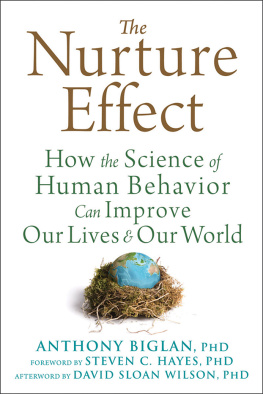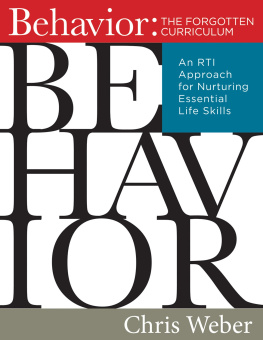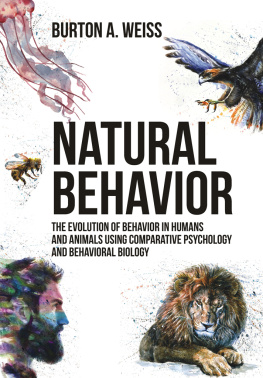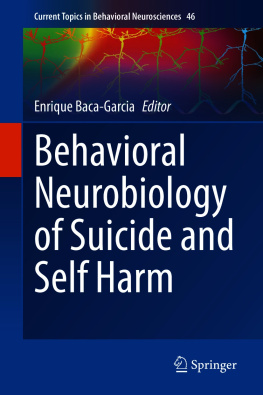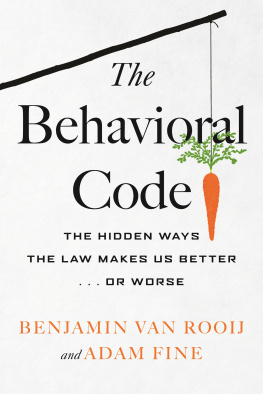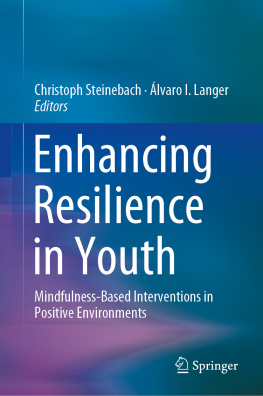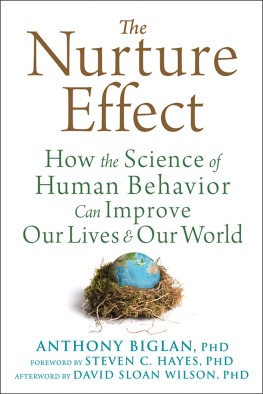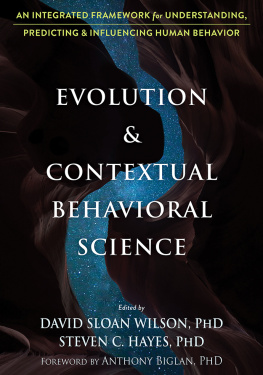Anthony Biglan, PhD, is a senior scientist at Oregon Research Institute, and a leading figure in the development of prevention science. His research over the past thirty years has helped to identify effective family, school, and community interventions to prevent the most common and costly problems of childhood and adolescence. He is a leader in efforts to use prevention science to build more nurturing families, schools, and communities throughout the world. Biglan lives in Eugene, OR.
Foreword writer Steven C. Hayes, PhD, is Nevada Foundation Professor in the department of psychology at the University of Nevada. An author of thirty-four books and more than 470 scientific articles, he has shown in his research how language and thought leads to human suffering. He cofounded acceptance and commitment therapy (ACT)a powerful therapy method that is useful in a wide variety of areas. Hayes has been president of several scientific societies and has received several national awards, including the Lifetime Achievement Award from the Association for Behavioral and Cognitive Therapies.
Afterword writer David Sloan Wilson, PhD, is president of the Evolution Institute and SUNY distinguished professor of biology and anthropology at Binghamton University. He applies evolutionary theory to all aspects of humanity, in addition to the biological world. His books include Darwins Cathedral, Evolution for Everyone: How Darwins Theory Can Change the Way We Think About Our Lives, The Neighborhood Project, and Does Altruism Exist?

What a wonderful and truly beneficial gift that Anthony Biglan has given us! Thought-provoking and inspirational, Biglan shares with us his wisdom and provides a compelling call to individuals, families, schools, communities, organizations, corporations, and policymakers to be part of creating nurturing environments. The Nurture Effect is a science-based prescription for creating a more health-enhancing society. Biglan concisely summarizes his hard-earned wisdom from a remarkable career as a clinician and scientist, his knowledge of diverse scientific fields, as well as his rich life experiences, including as husband, father, and grandfather. Transformative and practical, it provides a guide for the foundation of a more caring and health-promoting society.
Kelli A. Komro, PhD, professor of health outcomes and policy at the College of Medicine, associate director of the Institute for Child Health Policy, and Research Foundation Professor at the University of Florida
Anthony Biglans vast intelligence and scientific experience are brought together in The Nurture Effect to provide a vision, a road map, and a sense of optimism about solving the very real social problems facing our country. Evidence-based behavioral programs and policies provide the basis for Anthonys argument that greater attention to nurturing, as opposed to coercionat home, in schools, with peer groups, within communities, and even as public policywill lead to healthier and better-adjusted youth and adults. The book is critically important as we consider how we are raising the current and next generations, and can serve to guide discussions on next steps in science, policy, and practice.
Cheryl L. Perry, PhD, professor and regional dean at The University of Texas School of Public Health, Austin Regional Campus
Anthony Biglans latest book The Nurture Effect is a powerful reminder of the transformational impact a nurturing environment has on individuals well-being throughout their lives. In documenting many carefully selected examples of evidence-based interventions from early childhood and through subsequent stages of development, it makes an outstanding contribution to the field of prevention science. Biglan makes a compelling case for widely implementing scientifically supported interventions that create nurturing environments in our homes, schools and communities. When individuals develop the social and emotional competencies they need to do well, their lives are permanently transformed. This book challenges policy makers, professionals, and the community at large to think well beyond individual benefit, and consider that behavioral science knowledge can apply to entire populations. I unreservedly endorse this excellent and timely contribution.
Matthew R. Sanders, PhD, professor of clinical psychology and director of the Parenting and Family Support Centre at the University of Queensland, as well as founder of the Triple P Positive Parenting Program
Read this book, please read this book! The nurture effect impacts us daily in our health, intelligence, behavior, emotions, work, and relationships. The daily nurture effect even codes our gene expressionsomething my scientific colleagues and I only began to suspect one or two decades ago, but have proof of now. This book maps how we can intentionally nurture ourselves, our loved ones, our communities, and even our nations. All of this is based on rigorous practical science. If you want to improve the now and better the future, read this book and apply the nurture effect at home, at work or at school, and in your community.
Dennis D. Embry, PhD, president and senior scientist at PAXIS Institute
The Nurture Effect is a remarkably ambitious book that draws the blueprints for creating prosocial communities aiming to help people live healthier, value-directed, and enjoyable lives. Biglan explains how people can work together to reduce suffering and improve quality of living for each other, and supports these plans with reliable behavioral research. The science of this book is captivating because Biglan expresses the ideas in an understandable and practical manner. In other words, he simplifies the science of human behavior so you can use it to improve your own community. The Nurture Effect hits the ground running with clear, concise, well-stated facts about creating a social context for people to experience a life well-lived. Throughout the book, Biglan expands these ideas into the different branches of community, such as family, schools, work, peer-relations, and discusses howwhen approached appropriatelythey can make lasting positive contributions to individuals. The perspectives you gain from this book will not only assist you in helping your community to become stronger and healthier, but will also help you as an individual to experience those same positive outcomes.
D.J. Moran, PhD, founder of Pickslyde Consulting and the MidAmerican Psychological Institute
The Nurture Effect is exciting because it is grounded in science but leads us well beyond the fragmented slivers in which scientific findings are often delivered. Anthony Biglan persuades us that rather than focusing on preventing individual problems of family dysfunction, drug addiction, academic failure, child abuse, and even crime, we need to cut to the chase and attend to what all of these have in common. Biglan shows that poverty consistently makes it harder to help, and that nurture is so frequently missing. By integrating findings from the past fifty years in psychology, epidemiology, education, and neuroscience, he pulls out the common threads to show that it is possible to make families, schools, and the larger social context more nurturing, and ultimately to create the nurturing environments so vital to well-being and to preventing widespread harm.
Lisbeth B. Schorr, senior fellow at the Center for the Study of Social Policy, and coauthor of Within Our Reach
This marvelous book integrates the most compelling scientific knowledge about how we can improve the lives of citizens of this country with a bold call to action. Fundamentally, Anthony Biglana gifted and experienced behavioral scientistchallenges us to ask, What kind of society do we want? How can we use what we know to create such a society? His central thesis is that widely implementing what we have learned over decades in developing programs that nurture children, adolescents, parents and adults in families, in schools, and in the larger societywhich he calls a
Next page
